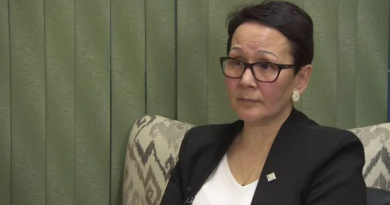Arctic Canadian territory blocks Facebook, Youtube in schools
 Government says it was using too much bandwidth
Government says it was using too much bandwidth
The Department of Education in Canada’s eastern Arctic territory of Nunavut has blocked social media websites such as Facebook and YouTube in schools.
It was strictly a business decision — the department says those websites were hogging too much bandwidth.
Department officials say social media sites were using so much bandwidth, that even email couldn’t get through the system.
They also say blocking the sites won’t cut off everything — students will still be able to use the ‘educational’ version of YouTube, which allows access to videos thought to be useful in the classroom.
Many students support the move.
Oleepeeka Irngaut says blocking social media was a good decision.
“I think it’s really good. I think you get to spend more time doing your work than Facebooking or going on YouTube,” she said.
Some students say blocking Facebook has other benefits, as well.
Monty Keenainak is in Grade 11 at Inuksuk High School. He said he doesn’t see much bullying at school, but he does see it online.
“They don’t really show, like, how angry they are to you. They just talk online and then not do it at school,” he said.
Alashua Crowley is part of an anti-bullying group at the school. She points out that students still have access to social networking sites at home, but says this is a step in the right direction.
“It’s good because the school is trying to stop it and social media definitely has something to do with bullying.”
Teachers should have been consulted, says association
However, some Nunavut teachers aren’t happy about the decision.
Robin Langill, who is president of the Nunavut Teachers’ Association, said teachers should have been consulted about the idea beforehand.
“When the government institutes a new policy that affects our members, we should know about it before it is implemented so that we can make our teachers aware of it and maybe have an opportunity to discuss the issue with the government.”
Langill said he has heard from many teachers who used sites such as YouTube to liven up their lessons. He said now, teachers are using their own limited bandwidth at home to download videos and other material for the classroom.
For more northern stories from CBC News, click here



